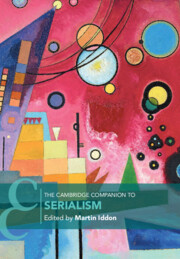Book contents
- The Cambridge Companion to Serialism
- Cambridge Companions to Music
- The Cambridge Companion to Serialism
- Copyright page
- Contents
- Figures
- Tables
- Contributors
- Preface
- Part I Contexts I
- 1 Theorising Serialism
- 2 The Aesthetics of Serialism
- 3 Serialism in History and Criticism
- Part II Composers
- Part III Geographies
- Part IV Contexts II
- References
- Index
3 - Serialism in History and Criticism
from Part I - Contexts I
Published online by Cambridge University Press: 07 March 2023
- The Cambridge Companion to Serialism
- Cambridge Companions to Music
- The Cambridge Companion to Serialism
- Copyright page
- Contents
- Figures
- Tables
- Contributors
- Preface
- Part I Contexts I
- 1 Theorising Serialism
- 2 The Aesthetics of Serialism
- 3 Serialism in History and Criticism
- Part II Composers
- Part III Geographies
- Part IV Contexts II
- References
- Index
Summary
Writing about serialism by its earliest practitioners tended to underline its evolutionary qualities, something made easier by the baroque and classical connections of early examples from the 1920s like Schoenberg’s Suite for Piano op. 25 and Wind Quintet op. 26. Such an emphasis did not prevent more conservative critics from condemning twelve-tone music as ‘mathematical’. But by the early 1950s, there was more cogent criticism from younger composers, claiming that Schoenberg and Berg had failed to understand the innovative implications of twelve-tone methods. Boulez and Stockhausen in Europe and Babbitt in the United States were among those who explored a more systematic, stylistically radical serialism. But in the later Stravinsky, and in Boulez’s music after 1970, this avant-garde spirit gave way to techniques that were able to make productive compromises with more traditional ideas about musical materials and structures; at the same time, writing about serialism turned increasingly pedagogical, offering academic models for analysis and composition.
- Type
- Chapter
- Information
- The Cambridge Companion to Serialism , pp. 37 - 54Publisher: Cambridge University PressPrint publication year: 2023



